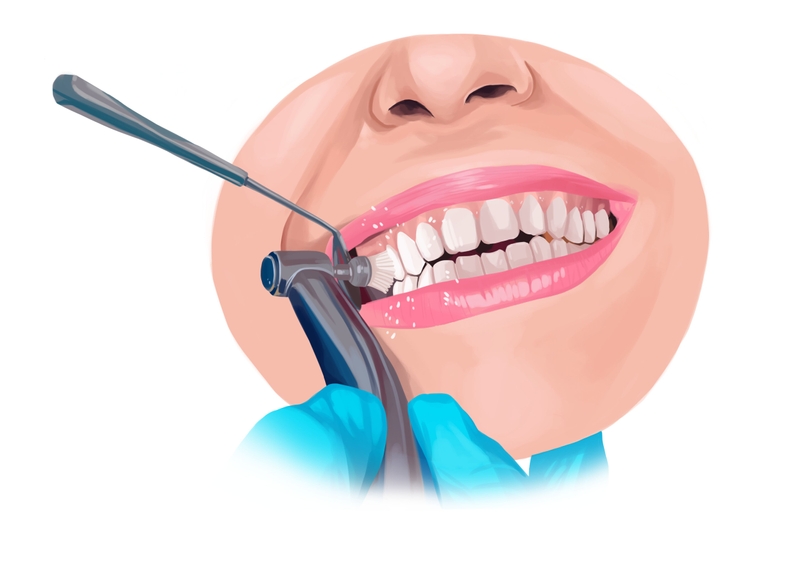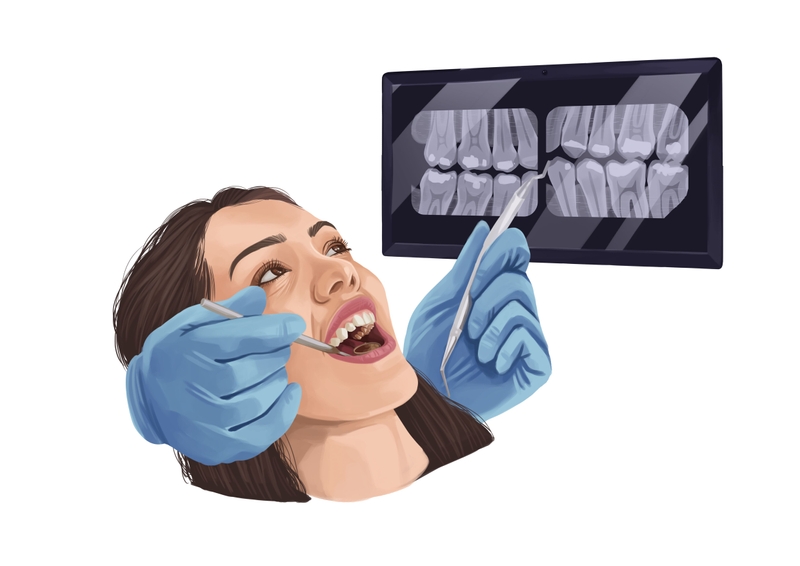- Professional dental cleaning is important for maintaining good oral and overall health. You cannot remove plaque and tartar at home.
- The frequency of dental cleaning appointments depends on the condition of your mouth and oral health. A standard recommendation is cleaning twice a year.
- Certain patients, such as those with diabetes, HIV/AIDS, or gum disease, should make more frequent appointments.
Get your smile ready for anything. Use Authority Dental to find dentists open now near you. It’s simple, secure and free.
Learn what professional teeth cleaning is, how it works, and why regular dental cleanings are important for healthy teeth and gums.
Teeth cleaning procedure

Picture by Authority Dental under CC 2.0 license
A standard teeth cleaning, otherwise called a prophylaxis, is a routine dental procedure. Special tools are used to remove plaque, calculus, and stains from the surfaces of teeth above the gum line.
Dental cleaning is appropriate for primary, transitional, and adult dentition. This appointment will likely include an exam by the dentist and X-rays.
The procedure is often conducted by a dental hygienist working under a dentist's supervision. The entire process usually takes about 30 to 60 minutes.
Preliminary chat
Let the dental professional know if there have been any changes to your dental history or if you are taking any medication. You will then be given instructions and information on what is going to happen. An X-ray, for example, a bitewing, might also be taken.
Periodontal charting
This step is also known as periodontal probing. The hygienist will measure the depth of your gum pockets with a special tool. The ideal depth is 1-3 mm; anything more may indicate periodontitis or gingivitis.
Scaling
If your gum pockets are within the normal range, the dental professional will use an ultrasonic scaler and/or hand instruments to remove plaque and tartar from the surfaces of your teeth. You might hear some scraping, which is entirely normal.
Polishing
A gritty toothpaste (you can usually pick the flavor) will be used to polish your teeth. Afterward, an air polisher may be used to smooth them further.
Flossing
A teeth cleaning is an excellent opportunity for an expert flossing session. All contact areas will be cleaned.
Fluoride treatment
A combination of a fluoride rinse, trays, and/or fluoride varnish might be used to remineralize the dentition.
How often should you have your teeth cleaned?
Depending on the state of your mouth (your everyday oral hygiene and how often you visit your dentist), you might need a regular or a deep cleaning.
A standard cleaning is a routine procedure that should be performed twice a year. The appointments may need to be more frequent for those who are:
smokers,
people with diabetes,
under significant stress,
taking medication that causes dry mouth,
affected by HIV/AIDS or cancer,
experiencing orthodontic issues,
pregnant, or
those who have a history of gum disease or take oral contraceptives.

If you have receding gums, you may need scaling and root planing or more invasive procedures, such as debridement or surgical intervention.
Is professional tooth cleaning necessary?

Picture by Authority Dental under CC 2.0 license
Yes. A professional teeth cleaning is crucial to both your oral and general health. It cannot be equaled by the best oral hygiene conducted at home. About half an hour after you finish any meal or snack, your saliva production slows. The pH of your mouth allows a particular kind of bacteria to thrive.
The bacteria consume the starch and sugar left behind after you eat. They will digest it and excrete a shiny film called plaque that will cover your teeth. This gives them a hiding spot, safe from brushing and mouth rinsing. They also produce lactic acid, which begins eroding the enamel, causing cavities.
The only way to remove calculus (hardened plaque) is to have your teeth professionally cleaned.
Harry Lee, DMD emphasizes: "This is not just about aesthetics; it is about preserving your bone. Calculus below the gumline acts like sandpaper, constantly irritating the gum tissue, which leads to inflammation (gingivitis) and, eventually, bone loss (periodontitis)."
"In my practice, the standard six-month interval is crucial because it interrupts this destructive cycle before irreversible bone damage occurs. We are giving the entire mouth a necessary reset button," he adds.
What is more, covering the cost of teeth cleaning regularly can help prevent the need for more expensive medical procedures. A cosmetic dentist may offer treatments such as teeth whitening to repair damage caused by neglect. However, this can be avoided, as teeth cleaning helps remove stains.

In addition to daily brushing and flossing, some individuals include oral health supplements as part of their routine to support a balanced oral microbiome. Oral probiotics are designed to complement good oral hygiene by helping maintain balanced oral bacterial communities between professional cleanings. These supplements are not a replacement for professional teeth cleaning and should be used alongside regular dental visits and proper home care.

FAQ
How long does a dental cleaning take?
A prophylactic cleaning can take between 30 minutes and an hour.
How to relieve pain after dental cleaning?
If you practice regular oral hygiene at home, complete with brushing and flossing, a cleaning should cause minimal discomfort. Sensitivity and pain are reactions that concern patients who neglect to take care of their mouths as advised by the ADA.
In the case that you are highly sensitive to pain or suffer from dental anxiety, you can take an OTC painkiller before your appointment or ask for an anesthetic. It is also a good idea to switch to a desensitizing toothpaste or mouth rinse a few weeks prior to your appointment. Try not to eat acidic foods, such as citrus fruits. Hot and cold foods can also cause you pain directly after a cleaning.
What teeth cleaning tools do dentists use?
Your dentist will use an ultrasonic scaler to remove plaque, tartar, and calculus from your teeth with minimal physical contact. If this is not enough, the process is repeated with hand instruments. These dental cleaning tools are only used in extreme cases.
What does a teeth cleaning kit contain?
DIY dental cleaning kits can be purchased online. They often contain a dental pick, a scaler, a rubber stimulator, and a dental mirror. Using these may be a good idea in emergencies, for example, when something gets stuck in your teeth or gums, causing discomfort.
Otherwise, you are better off investing in rubber instruments or a water flosser to prevent damage to your teeth from handling these without experience.
How is dental cleaning related to general health conditions?
Neglecting dental care can affect general health, just as poor general health can affect oral health. In particular, foregoing these appointments has been linked to heart disease.
Other general conditions that make themselves apparent in the mouth include asthma, cancer, HIV or AIDS, obesity, diabetes, as well as kidney, lung, and liver disease.
Harry Lee, DMD
When a patient asks why they need a professional cleaning twice a year when they brush religiously, I explain that it all comes down to plaque versus calculus. Daily brushing and flossing removes plaque—the soft, sticky bacterial film. However, if plaque sits on the tooth for too long, it hardens into calculus, or tartar. No matter how strong your toothbrush is, you cannot remove calculus at home. That is why the hygienist uses specialized hand tools and ultrasonic scalers—they physically break away the hardened material from your enamel and below the gumline.